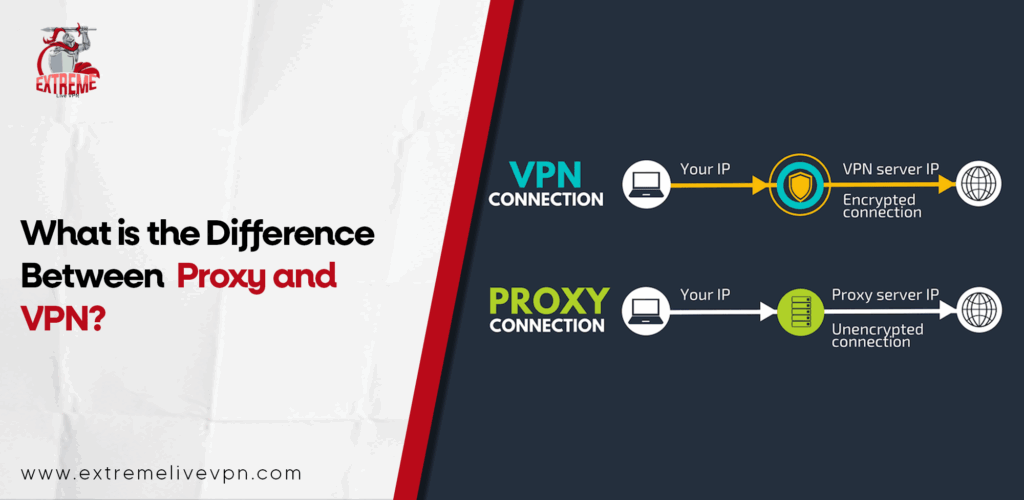While staying online, protection of data is more important than ever. To access restricted content, stay anonymous or browse without revealing your identity, two important tools that always come to mind are proxy and VPN. Both are blooming due to their privacy features and are designed to secure the online privacy of the users. But they are different from each other in various ways. A proxy acts as an intermediate between the computer and the internet, while a VPN encrypts all the incoming traffic. This blog provides a complete guide about the differences between proxy and VPN. It will allow you to choose the right privacy solution for securing your online privacy.
What is a Proxy?
A proxy server is a middleman between a device and the internet network. It filters the incoming traffic and protects users from cyber threats and malicious attacks. It conceals the IP address of the users, and internet traffic comes from a different IP address of the proxy server. But not conceal all web activities.
How Does a Proxy Work?
A proxy server is like an office mailroom that handles all the communication between users and the Internet and also secures their identity from intruders. A secure connection is set up between the Internet network and the device when it is configured for proxy. The data, instead of directing to the respective website, first passes through a proxy server. The proxy server changes the original IP address of the server with the server’s IP address. Then, the traffic moves towards the website with the new IP address. In this way, it conceals the real identity of the users.
Pros of Using a Proxy Server:
There are the following advantages of using a proxy server;
Easy to use: Proxy servers are simple and easy to set up. Mostly, these servers are free to use.
Conceals IP address: A proxy veils the IP address of the users and hides their identity from ISPs and hackers.
Access geo-restricted content: It also helps users to circumvent regional limitations. You can see your favorite content without any limitations, like a VPN.
Manage low-security tasks: A Proxy server is perfect for managing low-security tasks.
What is a Virtual Private Network Server (VPN)?
A VPN server creates a secure and encrypted tunnel through which all incoming and outgoing traffic passes. A VPN encrypts all the web activities of the users. It may be in the form of a browser extension or app.
Working Principle of a VPN:
An encrypted tunnel is established between the device and server when a user connects their device with a VPN server. All the users’ web traffic passes through the secure tunnel. The encryption makes it unreadable to anyone who wants to interrupt the traffic. This data is then sent to the website. no one can decode or detect the user’s original location.
Pros of VPN:
Following are the benefits of using a VPN server;
Encipher all data: A VPN offers a high level of security by coding all the traffic and online data of the users.
Hides IP address and location: your location and IP address remain hidden and private when using a VPN.
Bypass all types of censorship: It allows users to detour firewalls, internet censorship and regional restrictions instantly.
Suitable for streaming and torrenting: You can use a VPN for multiple purposes to secure your online identity. It is perfect for anonymous torrenting, browsing and streaming all over the world.
Differences Between Proxy and VPN:Security and Privacy:
Here are some of the main features that distinguish a proxy and VPN server from each other.
VPN:
A VPN offers a high level of encryption and security by coding all traffic. This makes all data and information hard to decode or read. Due to this feature, a VPN is a suitable choice for securing financial details. A reliable VPN also comes with advanced security features, including a kill switch, and two-way authentication. You can go for them to add an extra layer of protection to their data.
Proxy:
A proxy only conceals the IP address of the users when traffic routes through the server. Although it is also secure, it is not like a VPN. Here, data is always vulnerable to interruption. A proxy doesn’t provide its users extra security, like DNS, to protect sensitive information during sensitive activities, such as mobile banking.
Speed and Performance:
VPN:
Most people think that a VPN slows down the speed of the internet. But this is not true all the time. The performance and speed of the VPN depends on its strength of encryption, the number of devices that can be attached and the server location. A reliable VPN server provider offers its users a nearby data center to avoid latency issues. Furthermore, if your server has a high capacity of connecting with multiple devices, then it will work well.
Proxy:
A proxy doesn’t have a heavy flow and data encryption, so it works faster than a VPN. You can quickly unblock websites and reach blocked content with a proxy server. Keep in mind that this speed comes at the cost of security.
Device-Wide Protection:
VPN:
A VPN provides system-wide protection, whether you are using a browser app, app Vpn, or system service. It ensures the protection of all internet traffic. You can install an app or use a browser extension to experience complete privacy across all activities.
Proxy:
With a proxy server, you can protect data from a specific application for which it is configured. That means the data from other applications will not be safe with this server at one time. It is effective only for people looking for complete online privacy.
Cost and Accessibility:
VPN:
VPNs are a bit more expensive than proxies, but their price justifies their features. Premium VPN comes with advanced features, including no-log policy, faster speeds, multi-device support and others. Most companies also offer free VPN services, but they are not as secure.
Proxy:
Many proxy services are free or low-cost. That’s why they are accessible. But you can’t enjoy privacy and security with a VPN. In some cases, they may even log your activity and sell users’ data, which defeats the purpose of confidentiality.
Conclusion:
Both proxy and VPN are powerful security and privacy tools. They mask the IP addresses and help users access restricted content worldwide quickly. But when it comes to functioning and encryption, theddy are different from each other in various ways. A VPN has strong encryption features and offers a high level of security. It allows users to connect multiple devices at a single time. On the other hand, a proxy is suitable for low-level security tasks. It secures traffic from only a single application at one time. So, selection of VPN or proxy depends on your needs. If you just want to unlock restricted content and maintain anonymity, a proxy is suitable. But if you wish to have a high level of encryption, VPN is the best option for you.





